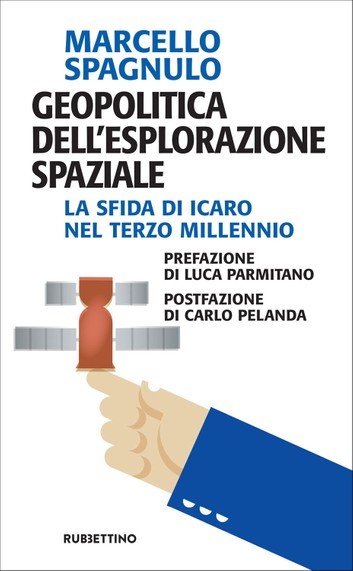Author: Giulia De Rossi – 22/04/2020
When I first approached Marcello Spagnulo book “Geopolitics of the space exploration. Icarus challenge in the Third Millenium” (Geopolitica dell’Esplorazione Spaziale – La sfida di Icaro nel terzo millennio, Rubbettino Editore, 2019) was because of my first article.
Being on the opposite side of the scientific field, because of pursuing studies or a career in the humanistic field, can often lead to the conviction of the limitation that standing on one side can bring.
The struggle of reading books about scientific topics is even more accentuated by authors that often remark the discrepancy with the aid of technical terms, making people give up to fast.
Well, I would definitely not put the writer of the book in this circle, because despite being an aeronautical engineer and spending most of his life with mathematics and physics, the book perfectly reflects his excellent well-versed knowledge in history and geopolitics. The book fits perfectly to every type of reader.
As praiseworthy can be recognised his capacity to maintain the strand between, the technological progress in outer space while going through an entire historical excursus that has involved, primarily, the United States of America and the Soviet Union. Meanwhile, he analyses the geopolitical scenario behind it, and the influence of new actors, that have entered the scene.
Fascinating is the idea of the book’s title – ” (…) Icarus challenge in the Third Millenium” – the aim to involve a figure of the Greek mythology is to underline and make clear from the beginning the real purpose of the author: the boundaries of humankind.
In the introduction, he makes a small resume of Icarus story, the boy that pushed himself too far and beyond his limits, reaching the death instead of freedom.
There is a perfect allegory between Icarus and astronauts- the first can fly and the second can either fly or float in the cosmos. How both reached this capacity, despite being simply humans, is thanks to the technology: the intellect of Daedalus brought him to create wings glued with wax and rockets can reach the space thanks to the boost given by the expelled propellant.
Icarus caused his death, because his curiosity, lead him to fly too near to the surface of the sun, bringing the wax on his wings to melt, letting him precipitate. Could this, be the destiny of humans nowadays?
Technology is the daughter of military needs. It has become the possibility to be developed, year by year, in a faster way, thanks to the wars on Earth, especially during the conflict between the USA and the Soviet Union.
Firstly, the goal was to secure national boundaries through the use of missiles, after missiles were enough developed, governments decided to up the ante, trying to send the first man into space. Afterwards, through the collaboration of Nations and the creation of various space agencies, the International Space Station is now officially a platform, that floats in orbit.
Technology has brought new typologies of threats, mainly concentrated in the anti-satellite weapons and cyber-attacks. In turn, those types of weapon have brought, Countries to invest more in the military sector, because of being more aware of the dangers caused by the Space-race.
After concluding successfully the first mission on the Moon and so attesting that it is possible to survive on another Planet, other actors have entered the scene, besides Russia and USA: Europe and China.
Discovering the Moon’s surface in a more deepened way has made it possible to discover the economic advantage that deep space exploration could bring. “Artemis III” will be a crewed mission that will reach in 2024 the Southpole of the Moon.
Again, humanity is walking even more forwards to their limits. This time, the innovation lies in the fact, that along with governmental agencies also private actors have made their first appearance, with a significant amount of investments.
The last chapter of the book is called ” Next stop: Mars? “
As we already know, Icarus precipitates because his curiosity has lead him to overestimate the power of his flying gadgets ( it can be considered as technology by that time!). How far will humanity push itself, to understand that the limits are almost reached and there is no comeback?
The reality lies in the fact that the possibility to colonise another Planet is still far away, and living on the other Planet will not make possible “to take your dog out for a walk”.
The Space is a game field, where anarchy exerts its domain. Behind the collaboration between Nations, new challenges are taking place and the race to military superiority in the technology arena has newly begun.
An uncertain future is awaiting us and only through the comprehension of geopolitical relations, we will understand what is going on, above our heads.

Marcello Spagnulo è Ingegnere Aeronautico. Ha lavorato per trent’anni nel settore aerospaziale in Italia, Francia ed Olanda, sia presso aziende private sia presso agenzie governative, ricoprendo diversi incarichi manageriali. Nel corso della sua carriera ha pubblicato più di trenta articoli scientifici presentati a convegni internazionali. È autore del libro di divulgazione Lo Spazio oltre la Terra edito da Giunti, e del libro di testo Elementi di Management dei Programmi Spaziali edito da Springer- Verlag e tradotto in lingua inglese e cinese. È articolista per la rivista «Airpress», mensile per le politiche dell’aerospazio e difesa.

Giulia De Rossi, UnInt – Università degli Studi Internazionali di Roma
